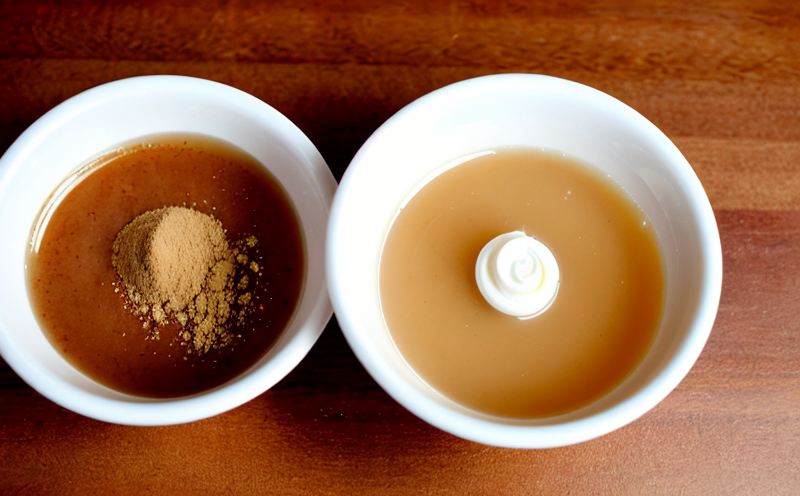GB T 29602 Flavor Aroma Compound Testing in Tea
The GB/T 29602-2013 standard provides a comprehensive framework for the analysis of flavor and aroma compounds present in tea. This testing is critical for ensuring quality control, safety, and compliance with regulatory standards across various sectors including food manufacturing, beverage production, and retail. Understanding the intricate composition of tea flavors and aromas helps manufacturers to improve product quality, enhance consumer satisfaction, and maintain a competitive edge.
The standard specifies methods for identifying and quantifying volatile and non-volatile compounds responsible for flavor and aroma in tea products. It covers key steps such as sample preparation, extraction techniques, instrumental analysis, and interpretation of results. Laboratories using this protocol must ensure that their equipment meets the necessary specifications outlined by GB/T 29602 to guarantee accurate and reliable test outcomes.
One important aspect of GB T 29602 testing is the use of advanced analytical instruments like gas chromatography-mass spectrometry (GC-MS) and high-performance liquid chromatography (HPLC). These tools enable precise detection and quantification of trace amounts of flavor compounds, which can vary significantly between different tea varieties. Proper sample preparation is also crucial; this involves selecting representative samples from the batch being tested, homogenizing them, and extracting volatile components through steam distillation or headspace sampling.
Another critical element in GB T 29602 testing is the calibration of analytical instruments against certified reference materials (CRMs). CRMs provide consistent standards for measuring concentrations of target compounds. By using CRMs during both initial instrument setup and routine quality checks, laboratories can ensure that all measurements align with internationally accepted benchmarks.
GB T 29602 emphasizes the importance of method validation to establish confidence in test results. Validation ensures that analytical methods produce consistent and accurate data under defined conditions. Key parameters for validation include linearity range, detection limits, repeatability, and reproducibility. Laboratories adhering strictly to these guidelines help maintain high standards within the industry.
The standard also addresses potential challenges faced when conducting flavor and aroma compound tests on tea. These include variations in raw material quality due to environmental factors or production processes; variability in extraction efficiency depending on temperature and time settings; and interference from non-target compounds that may affect measurement accuracy. To mitigate these issues, laboratories should follow strict protocols for sample handling and processing, employ robust quality control measures throughout each stage of testing, and continuously monitor instrument performance.
By leveraging GB T 29602 flavor aroma compound testing in tea, organizations can achieve several benefits. Firstly, it enhances product consistency by identifying variations in flavor profiles among batches or suppliers. Secondly, it supports regulatory compliance through accurate measurement of regulated substances like caffeine content or heavy metal levels. Thirdly, it fosters innovation by allowing developers to explore new flavors and formulations while ensuring safety and quality.
Understanding the nuances of GB T 29602 testing is essential for anyone involved in tea production or related industries. It offers valuable insights into how flavor and aroma compounds contribute to the overall sensory experience of consuming tea, enabling informed decision-making at every stage from raw material selection to final product release.
Benefits
Implementing GB T 29602 flavor aroma compound testing in tea brings numerous advantages that significantly impact both operational efficiency and market performance. Here are some key benefits:
Enhanced Product Quality: Accurate identification of flavor compounds helps manufacturers maintain consistent taste profiles, which is crucial for building brand loyalty.
Regulatory Compliance: Ensures adherence to relevant national and international standards, reducing the risk of non-compliance penalties.
Innovation Opportunities: Allows exploration into novel flavor combinations without compromising safety or quality standards.
Cost Efficiency: Early detection of issues reduces rework costs by preventing flawed batches from reaching consumers.
Better Consumer Satisfaction: Consistent and high-quality products lead to greater customer satisfaction, fostering long-term relationships.
Competitive Advantage: Superior product quality can differentiate a brand in competitive markets, attracting discerning customers.
In summary, implementing GB T 29602 flavor aroma compound testing in tea not only ensures compliance with established standards but also drives innovation and enhances overall business performance.
International Acceptance and Recognition
The acceptance and recognition of GB/T 29602 flavor aroma compound testing in tea extend beyond national boundaries, influencing global markets. This standard is widely acknowledged for its rigorous approach to ensuring product quality and safety, making it an indispensable tool for tea producers operating internationally.
Many countries recognize the importance of GB/T 29602 due to its alignment with international standards such as ISO (International Organization for Standardization) and ASTM (American Society for Testing and Materials). Compliance with these guidelines enhances a company's reputation, facilitating smoother trade relations between nations. For instance, exporters who adhere strictly to GB/T 29602 are more likely to secure contracts from overseas buyers seeking reliable suppliers.
The widespread adoption of this standard also contributes to environmental sustainability efforts by promoting the use of sustainable agricultural practices and reducing waste through efficient production processes. By adhering to internationally accepted protocols, tea companies contribute positively towards global environmental goals without compromising on quality or taste.
Moreover, certification bodies often consider compliance with GB/T 29602 as part of their assessment criteria when evaluating applications for certifications like HACCP (Hazard Analysis and Critical Control Points) or ISO 14001 (Environmental Management Systems). Such credentials further bolster a brand's credibility among consumers concerned about ethical sourcing and responsible manufacturing.
In conclusion, the international acceptance and recognition of GB/T 29602 flavor aroma compound testing in tea underscore its significance not only domestically but also globally. Its comprehensive approach to ensuring product quality, safety, and sustainability positions it as a leader in tea standards worldwide.





